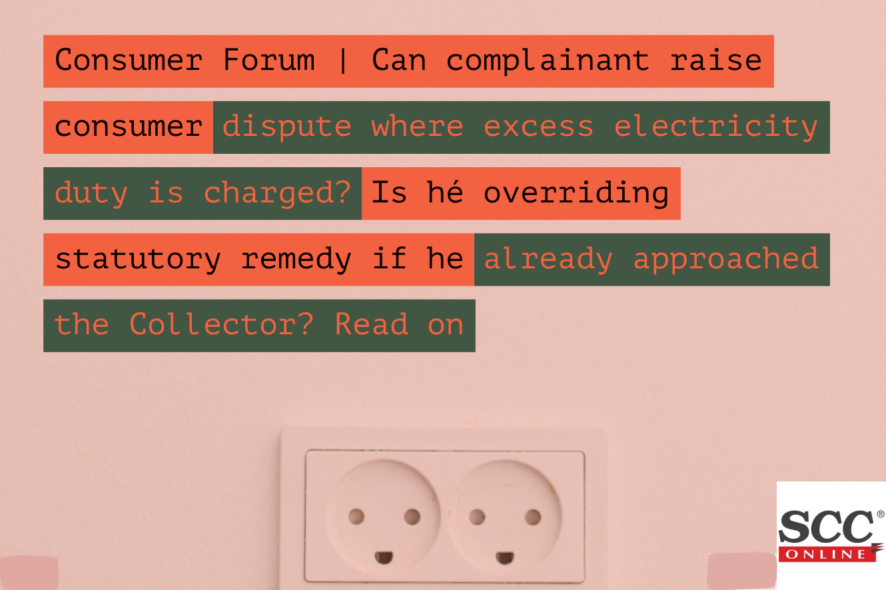Consumer Disputes Redressal Commission Gujarat State, Ahmedabad: Justice V.P. Patel, President and U.P. Jani, Member, addressed an appeal which was raised in light of a complaint raised due to excess of electricity duty being charged.
Appellants filed the instant appeal under Section 15 of the Consumer Protection Act, 1986 on being dissatisfied with the decision of the District Commission.
Factual Matrix
Complainant obtained electric connection for their industrial undertaking and consumed exclusively low-tension energy from the opponent company. Energy bills were raised by the opponent corporation and said bills included charges of electricity duty liable under the Bombay Electricity Duty Act, 1958 (Electricity Act). Complainant realized in the year 2012 that the opponents have been collecting electricity duty at a higher rate than the prescribed rates under the Electricity Act.
Opponent charged the electricity duty at the rate of 60%, 30%, 15%, 50% or 25% without any basis. Further, it was stated that the charges of electricity duty were collected by the opponent illegally and unconstitutional in service. It was stated that the opponents could charge the electricity duty as per rules, but they have charged at a higher rate than prescribed in the rules.
Vide letter on 19-12-2012, opponent replied that the electricity duty was required to be collected at the rate of 10% as per the rules and they have started to issue bill with electricity duty at the rate of 10%. Therefore, the complainant had filed a consumer complaint about the difference in amount.
Limitation Period
Limitation prescribed under the local or special act will be applicable and no general provision of limitation Act will be applied for counting prescribed period.
As per Rule 12(1) of the Electricity Rules, the period of limitation prescribed is 1 year to file an application for refund. Electricity Rules were amended with effect from 31-07-2014.
Coram noted that the documents produced by the complainant addressed to the Collector of Electricity Duty can be said to be applicants for a refund of an amount of excess electricity duty under Rule 12 of the Electricity Rules.
Section 3 of Consumer Proetction Act cannot be said to be inconsistent with Rule 12 of the Electricity Duty Rules.
Since the Collector of Electricity Duty did not act in conformity with fundamental principles of judicial procedure, District Consumer Commission had jurisdiction to deal with the matter.
Commission observed that:
It is true that where the statute gives finality to the order of the Collector of Electricity Duty jurisdiction of Courts is excluded. However, Collector of Electricity Duty had not been complied with the fundamental principle of judicial procedure and acted in conformity of Electricity Duty Act.
In view of the above observation, Consumer Court has jurisdiction in this case.
Collector of electricity duty has not considered the period of 1 year under Section 12(2) of the rules and has not passed an order of refund of electricity duty, this amount to deficiency in service as well as unfair practice.
Hence, in the present matter, it was held that the complainant can get refund of the amount of Electricity Duty charge not prescribed under the Electricity Act and Rules.
As per the documentary evidence and arguments of the parties, Commission concluded that the complainant was not entitled to get any amount of electricity duty for last one year. Therefore, the appeal was allowed.
On verifying the amount deposited by appellant the same shall be refunded with interest. [Gujarat Urja Vikas Nigam Ltd. v. Cham Trawi Nets Organisation, Appeal No. 913 of 2014, decided on 24-05-2021]
Additional Read:
Section 2(1)(o) of Consumer Protection Act, 1986: Supply of electricity is included in the definition of service. [for the definition of “service” in CPA, 2019, see S. 2(42)]
Section 2(1)(c) of Consumer Protection Act, 1986: ‘Complainant’ means any allegation in writing made by the complainant that trader or service provider, as the case made, has charged for the goods or for the service mentioned in the complaint a price in excess of the price, fixed by or under any law in time being force.[for the definition of “complainant” in CPA, 2019, see S. 2(6)]







